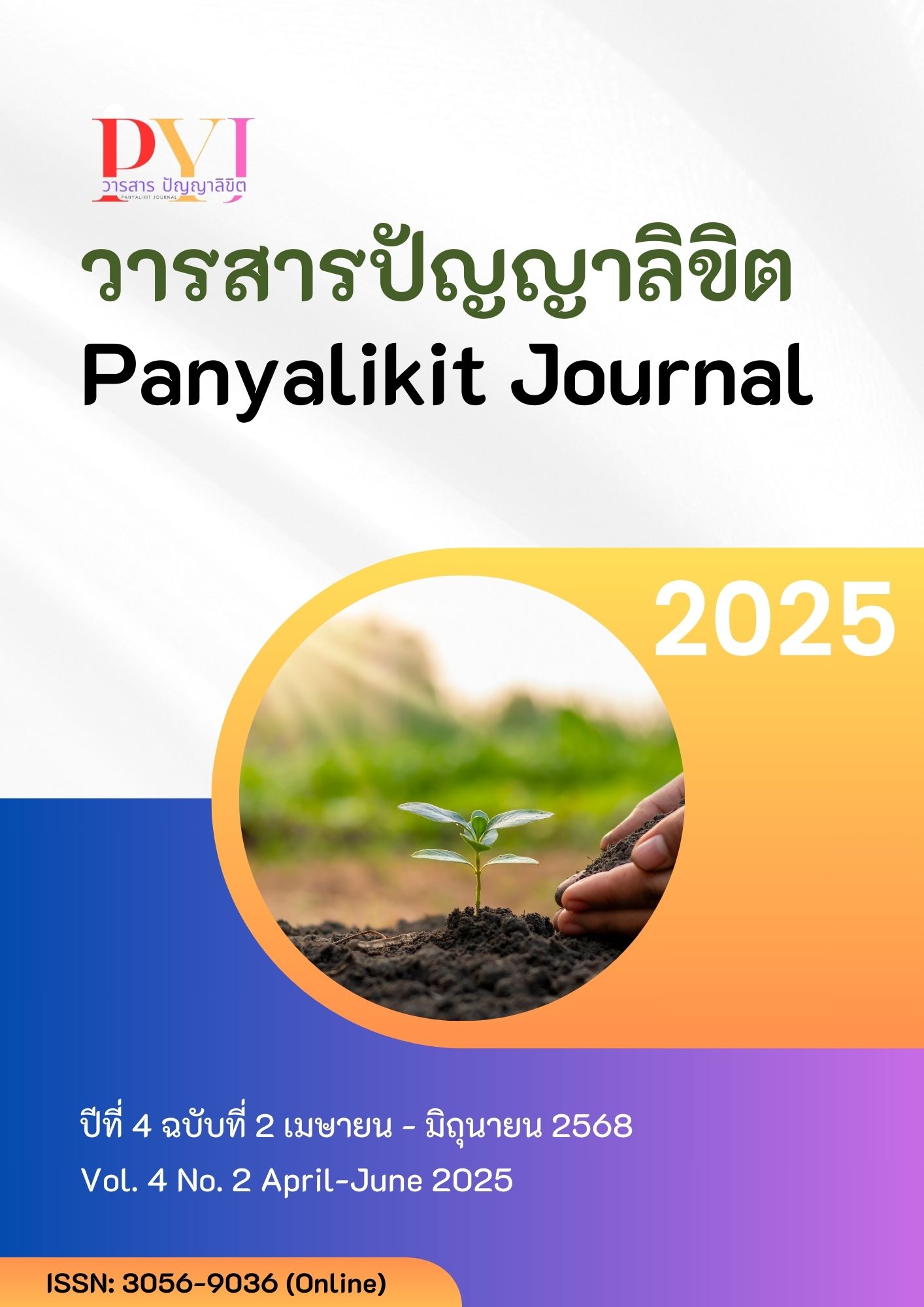แนวทางการพัฒนาการบริหารจัดการระบบบริหารงานงบประมาณ ของโรงเรียนเกาะพะงันศึกษา อำเภอเกาะพะงัน จังหวัดสุราษฎร์ธานี ตามแนวคิดทักษะการปรับตัว
Main Article Content
บทคัดย่อ
บทความวิจัยนี้มีวัตถุประสงค์ 1. เพื่อศึกษาสภาพปัจจุบันและปัญหาการบริหารจัดการระบบบริหารงานงบประมาณของโรงเรียนเกาะพะงันศึกษา อำเภอเกาะพะงัน จังหวัดสุราษฎร์ธานี ตามแนวคิดทักษะการปรับตัว 2. เพื่อสร้างแนวทางการพัฒนาการบริหารจัดการระบบบริหารงานงบประมาณของโรงเรียนเกาะพะงันศึกษา อำเภอเกาะพะงัน จังหวัดสุราษฎร์ธานี ตามแนวคิดทักษะการปรับตัว โดยใช้วิธีวิจัยแบบผสมผสานทั้งเชิงปริมาณและเชิงคุณภาพ ใช้แนวคิดทักษะการปรับตัวเป็นกรอบการวิจัย พื้นที่การวิจัยคือโรงเรียนเกาะพะงันศึกษาและสำนักงานเขตพื้นที่การศึกษามัธยมศึกษาสุราษฎร์ธานี ชุมพร กลุ่มตัวอย่าง ทั้งหมด 46 คน ได้แก่ ผู้อำนวยการกลุ่มบริหารงานการเงินและสินทรัพย์สำนักงานเขตพื้นที่การศึกษามัธยมศึกษาสุราษฎร์ธานี ชุมพร จำนวน 1 คน ผู้อำนวยการหน่วยตรวจสอบภายในสำนักงานเขตพื้นที่การศึกษามัธยมศึกษาสุราษฎร์ธานี ชุมพร จำนวน 1 คน ผู้อำนวยการโรงเรียนเกาะพะงันศึกษา จำนวน 1 คน รองผู้อำนวยการโรงเรียนเกาะพะงันศึกษา จำนวน 2 คน คณะครูและบุคลากรโรงเรียนเกาะพะงันศึกษา จำนวน 41 คน โดยใช้วิธีคัดเลือกแบบเจาะจง เครื่องมือที่ใช้ในการวิจัยมี 2 ชนิด คือ
1) แบบสอบถาม 2) แบบสัมภาษณ์ วิเคราะห์ข้อมูลใช้สถิติพื้นฐาน ได้แก่ ค่าเฉลี่ย และค่าเบี่ยงเบนมาตรฐาน ร่วมกับการวิเคราะห์เนื้อหาจากการสัมภาษณ์
ผลการวิจัยพบว่า สภาพปัจจุบันของการบริหารจัดการระบบบริหารงานงบประมาณ ของโรงเรียนเกาะพะงันศึกษา อำเภอเกาะพะงัน จังหวัดสุราษฎร์ธานี ตามแนวคิดทักษะการปรับตัว การบริหารจัดการระบบบริหารงานงบประมาณ รวม 5 ด้าน โดยรวม พบว่ามีค่าเฉลี่ยเท่ากับ 4.57 แปลผลว่าสภาพปัจจุบันและปัญหา อยู่ในระดับมากที่สุด สำหรับประเด็นย่อยพบว่าค่าเฉลี่ยความคิดเห็นมีค่าตั้งแต่ 4.51 ถึง 4.63 แปลผลว่า สภาพปัจจุบันอยู่ในระดับมากที่สุดทุกด้าน โดยด้านที่มีค่าเฉลี่ยความคิดเห็นสูงสุด คือ ด้าน
2 งานบัญชี และด้านที่มีค่าเฉลี่ยต่ำสุด คือ ด้าน 4 งานแผนและควบคุมภายใน ตามลำดับ และสภาพการปรับตัวในการบริหารจัดการระบบบริหารงานงบประมาณของโรงเรียนเกาะพะงันศึกษา ด้านการปรับตัวด้านการปรับตัวระหว่างกัน โดยรวม พบว่ามีค่าเฉลี่ยเท่ากับ 4.38 แปลผลว่าสภาพการปรับตัวอยู่ในระดับมาก สำหรับประเด็นย่อยพบว่า ค่าเฉลี่ยความคิดเห็นมีค่าตั้งแต่ 4.17 ถึง 4.52 แปลผลว่าสภาพการปรับตัวอยู่ในระดับมากถึงมากที่สุด โดยข้อที่มีค่าเฉลี่ยความคิดเห็นสูงสุด มี 2 ข้อ คือข้อ 4.2 ท่านได้รับการสนับสนุนจากครอบครัวในการทำงาน และ ข้อ 4.5 ท่านมีส่วนร่วมในการทำกิจกรรมต่าง ๆ กับผู้อื่นได้อย่างเหมาะสม และข้อที่มีค่าเฉลี่ยต่ำสุด คือ ข้อ 4.3 ท่านสามารถจัดการกับปัญหาความขัดแย้งของบุคลากรในองค์กรได้อย่างสร้างสรรค์ ตามลำดับ
แนวทางการพัฒนาการบริหารจัดการระบบบริหารงานงบประมาณของโรงเรียนเกาะพะงันศึกษาอำเภอเกาะพะงัน จังหวัดสุราษฎร์ธานี ตามแนวคิดทักษะการปรับตัว ที่ได้จากการสัมภาษณ์ ได้แก่ การสนับสนุนจากสำนักงานเขตพื้นที่ในด้านการจัดส่งบุคลากรผู้เชี่ยวชาญมาให้คำปรึกษาเชิงลึกเสนอให้โรงเรียนมีคู่มือปฏิบัติงานด้านงบประมาณแบบเฉพาะของตนเองที่สอดคล้องกับบริบทของโรงเรียน มีการจัดอบรมต่อเนื่องเกี่ยวกับระบบบัญชี การเงิน และการใช้เทคโนโลยีควรมีเจ้าหน้าที่ประจำด้านสารสนเทศหรือจัดตั้ง “ศูนย์ข้อมูลภายใน” เพื่อสนับสนุนงานงบประมาณปรับใช้ระบบดิจิทัล เช่น โปรแกรมจัดการบัญชีและติดตามสถานะการใช้จ่าย เพื่อความโปร่งใส ส่งเสริมให้มีเวทีแลกเปลี่ยนเรียนรู้ระหว่างโรงเรียนเพื่อแบ่งปันแนวปฏิบัติที่ดี
Article Details

อนุญาตภายใต้เงื่อนไข Creative Commons Attribution-NonCommercial 4.0 International License.
เอกสารอ้างอิง
กนกอร สมปราชญ์. (2556). ภาวะผู้นำสำหรับผู้บริหารสถานศึกษา.ขอนแก่น : คลังนานวิทยา.กรอบแผนพัฒนาเศรษฐกิจและสังคมแหงชาติ ฉบับที่ 13. สืบคนเมื่อ 15 ธันวาคม 2567, จาก https://www.nesdc.go.th/main.php?filename=plan13
เพ็ญพรรณ บางอร. (2562). แนวทางการบริหารจัดการระบบบริหารงานงบประมาณของโรงเรียนสบเมยวิทยาคม อำเภอสบเมย จังหวัดแม่ฮ่องสอน (วิทยานิพนธ์ครุศาสตรมหาบัณฑิต). มหาวิทยาลัยราชภัฏเชียงใหม่.
โรงเรียนเกาะพะงันศึกษา. (2565). สรุปผลการดำเนินงานโครงการประจำปี 2565. ชุมพร: สังกัดสำนักงานเขตพื้นที่การศึกษามัธยมศึกษาสุราษฎร์ธานี ชุมพร.
โรงเรียนเกาะพะงันศึกษา. (2567). ข้อมูลโรงเรียนเกาะพะงันศึกษา. ชุมพร: สังกัดสำนักงานเขตพื้นที่การศึกษามัธยมศึกษาสุราษฎร์ธานี ชุมพร.
วรินทร์ พูลผล และธันย์พัทธ์ ใคร้วานิช. (2564). การปรับตัวทางเทคโนโลยีภายหลังโควิด-19: กรณีศึกษานักศึกษาในระดับอุดมศึกษา. ใน การประชุมนำเสนอผลงานวิจัยบัณฑิตศึกษาระดับชาติ ครั้งที่ 16 ปีการศึกษา 2564. (หน้า 2030-2042). ปทุมธานี: มหาวิทยาลัยรังสิต.
วันวิสาข์ แก้วก่า. (2565). แนวคิดทฤษฎีการพยาบาล. เชียงใหม่: มหาวิทยาลัยเชียงใหม่.
วิรัช สงวนวงศ์วาน. (2551). การจัดการและพฤติกรรมองค์การ. (พิมพ์ครั้งที่2). กรุงเทพฯ: เพียร์สันเอ็ดดูเคชั่นอินโดไชน่า.
วีระพงษ์ ก้านกิ่ง. (2560). สภาพและปัญหาการบริหารงบประมาณของสถานศึกษาขั้นพื้นฐาน สังกัดสำนักงานเขตพื้นที่การศึกษามัธยมศึกษา เขต 29 (วิทยานิพนธ์ปริญญามหาบัณฑิต). มหาวิทยาลัยราชภัฏอุบลราชธานี.
สัมมา รธนิธย์. (2556).หลักทฤษฎี และปฏิบัติการบริหารสถานศึกษา. (พิมพ์ครั้งที่ 4). กรุงเทพฯ: ข้าวฟ่าง.
สำนักงานงบประมาณของรัฐสภา สำนักงานเลขาธิการสภาพผู้แทนราษฎร. (2560). คู่มือสนับสนุนการปฏิบัติงานของสมาชิกสภานิติบัญญัติแห่งชาติในการพิจารณาร่างพระราชบัญญัติงบประมาณรายจ่ายประจำปีงบประมาณ พ.ศ. 2560. กรุงเทพฯ: สำนักงานงบประมาณของรัฐสภา.
แสงเทียน จิตรโชติ. (2560). แนวทางการบริหารงบประมาณตามหลักธรรมาภิบาลสำหรับสถานศึกษาขยายโอกาสในเขตอำเภอคลองหลวง จังหวัดปทุมธานี (วิทยานิพนธ์การศึกษามหาบัณฑิต).มหาวิทยาลัยมหาจุฬาลงกรณราชวิทยาลัย.
Burke, M. L. (1996). Medical-surgical nursing. Menlo Park, CA: Addison-Wesley.


